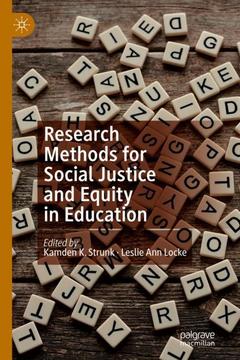Research Methods for Social Justice and Equity in Education, 1st ed. 2019
Coordonnateurs : Strunk Kamden K., Locke Leslie Ann

This textbook presents an integrative approach to thinking about research methods for social justice. In today's education landscape, there is a growing interest in scholar-activism and ways of doing research that advances educational equity. This text provides a foundational overview of important theoretical and philosophical issues specific to this kind of work in Section I. In Section II, readers engage with various ways of thinking about, collecting, and analyzing data, including qualitative, quantitative, and mixed methods approaches. Finally, in Section III, through case studies and research narratives, readers will learn about real scholars and their work. This book takes a wide-ranging approach to ways that various modalities and practices of research can contribute to an equity mission.
Kamden K. Strunk is Assistant Professor of Educational Research at Auburn University, USA, where he is also a faculty affiliate of the Critical Studies Working Group. He is a quantitative methodologist, teaching statistics for educational research at the graduate level. His research focuses on equity in education with particular emphasis on intersections of racial, sexual, and gender identities.
Leslie Ann Locke is Assistant Professor in the Department of Educational Policy and Leadership Studies at the University of Iowa, USA, and Director of the Research Initiative on Social Justice and Equity (RISE). Her research interests include leadership for social justice and equity, schooling for students from marginalized groups, equity-oriented education policy, and qualitative methodologies.
Draws from quantitative, qualitative, and mixed-methods approaches to research for social justice and equity in education
Includes diverse voices from various subdisciplines within education, different institution types, research approaches, and populations studied
Covers philosophical and theoretical issues, applied data collection and analysis, and career or research trajectory content
Date de parution : 03-2019
Ouvrage de 308 p.
15.5x23.5 cm



